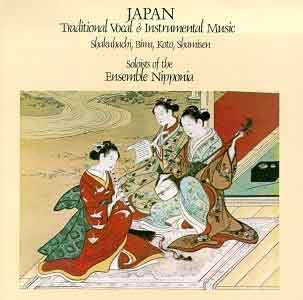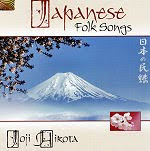Here were is the ESASHI OIWAKE (one type of japanese traditional songs) started. Esashi is a relatively small town located in the southern-west of Hokkaido. To go there from Hokadate (main city in the south of the north large island of Hokkaido) you have to take a local train from Hokadate. It takes 2-3 hours. In the main street you can visit a temple and see antic houses made of wood. The view of the harbour is quite nice. If you are not in Esashi during the festival (see below), the most interesting thing in the town is the small Museum of Esashi Oiwake, 15-20 min downwards on foot from the station. You can also visit Herring baron's houses (nishingoten) that they may still be seen in the shoreline. Some of them, such as Yokohama House and Nakamura House can be visited.
 Station of Esashi. A local train stops there.
Station of Esashi. A local train stops there. It is nice not always to travel with shinkansen (faster train)
 The harbour
The harbour

Wooden Houses in Downtown
Japanese settled in Esashi more than eight Centuries ago. The population is about 13,000 people. The relevance of this small town is why it was the place of birth of one of the best known "and hidden treasures" of the Japanese folk melodies: Esashi Oiwake.
ESAHI OIWAKE
This type of folk traditional songs originated in Nagano Prefecture, in the main island of Honshu, where it was sung by horseman (mago-uta) and it was spread throught Japan in the Edo Period. Once cross the sea and arrived in Esashi, in the north island of Hokkaido, the melody was modified and enlarged. The lyrics also changed. Instead of describing horsman's life in the mountains, they sang about the nature, the sea and fishing. The Esashi Oiwake has been transmitted to next generations for over 200 years. Two instruments usually accompanies to the singers, a flute (shakuhashi) and a 3-stringed lute (shamisen), in almost a free rhythm. The song "Esashi Okiage Ondo" (Esashi offshore fishing song). It is a fisherman's gwhich describes going herring fishing and returning to port. The sonf "Esachi Mochitsiki Bayashi (musical cccompaniment to rice cake pounding). These and other songs are designated Important Intangible Hokkaido Folk Cultural Property. http://www.hokkaido-esashi.jp/oiwake/english.htm.
FESTIVALS
Oiwake singers meet in Esashi once a year, in third weekend in September. It is held since 1963. They sing for two days the tunes of Oiwake tradition and a competion is organized. http://www.hokkaido-esashi.jp/three_festivals/english.htm
In Esashi is also held the Ubagami-Daijingu (shrine). Similar festivals or Matsuri are spread Japan during the year, specially in summer. The origin of the festival was to apprecite a bumper of herring fishing dating back to 360 years ago. There is a large parade around the town with people carrying a shrine, dressing in traditional clothes and playing the shakuhashi or shinobue (flutes) and taikos (drums). It is usually held in the second week of August http://miyatake-k.blogspot.com/.
They also celebrate the Doba Shishimai Dance. It has three acts, a Shinto ritual dance of three fawns, a pestle-swinging dance and a dance of hinds quarreling over a fawn. http://www.hokkaido-esashi.jp/oiwake/english.htm
ESAHI OIWAKE MUSEUM
In the town of Esahi there is a small museum about Oiwake. It is posible to listen to old recordings with headphones, to buy Oiwake CDs (very rare even in Japan) and see a performance of Oiwake by three musicians (a singer and two players of instruments, the shakuhashi and the shamisen). Performances are at 11 am, 1 pm and 2.30 pm. The have a unique large collection of 10 tapes/CDs of Oiwake songs for selling.

Entrance of the museum
 Sheet Music from the museum
Sheet Music from the museum

Shamisen and Shakuhashi from the museum
 Performance in the Museum of Esashi
Performance in the Museum of Esashi
INTERNATIONAL RECORDINGS
In my knowledge, there are very few recordings of CDs of Oiwake songs in the international market. In some folk colections of traditional japanese folk songs, sometimes it is possible to find an oiwake song.
Ensemble Nipponia - Japan: Traditional Vocal & Instrumental Music
1976 Explorer Series. In this album there are traditional songs. A representation of Oiwake is shown with the song entitled Esashi Pack-horseman's Song. It is very good album an one of the first of japanese music to be released on in international market. the Nonesuch series released several CDs of japanese traditional music in 2008, most of them were re-edition with different jacket.

Rie Yanagisawa. Kurokami. Traditional songs of Japan. There is koto, shamisen, voice and Clive Bell plays the shakuhachi. It was released in England by Saydisc in 2005. There is one exmaple of Esashi Oiwake. it can be dodownloaded from amazon.co.uk.

Joji Hirota. Japanes Folk Songs. Released by Arc Records in England. He is from Hokkaido. The ARC album was released in 2007. His album The Gate, in 1999, has a song song entitled Esashi Oiwake. For my taste, this album is over-arranged and and orchestred.

The song of Esashi Oiwake. Rhymes to prominent people of Hokkaido. This CD is the best one that I know. It was released by King Records in 2003 in the collection "Best Selected Library". Reference KCw 8628. I think it was produced in 1983. In relation with the others albums that I mentioned, this album is only Esashi Oiwake songs, and there is no other traditional songs from Japan. In addition you can listen the "pure" voices of the singers with her caracteristic way of singing. Wonderful touches of shakuhashi and shamisen in the songs made the album very enjoyable. It is a delicious shivering album for the senses and heart!!!. A jewel!!.

If you want to listen short examples of Esashi Oiwake music on-line I recommend to visit page of the "International Shakuhashi Society" written Dr David W. Hughes and Clive Bell. There are examples of shakuhashi music played by musicias such asTanigushi Yoshimubo, Koga Masayusi, Takahashi Kosui, Kikuchi Tansui and Clive Bell http://www.komuso.com/pieces/pieces.pl?piece=1837.
Note: Japan comes to my mind again after the earthquake of 11th-March-2011. So, I decided to write this small chapter of Oiwake music. In this date, Japan suffered a large earthquake near to the north-east coast. It was followed by a tsunami and a serious damage of Fukushima Nuclear Power Plant, which is one of the largest stations in the world. From the Nuclear Plant a leak and release of radiation went to the atmosphera. Japanese have a strong sense of community, those who loose their houses remain with order and friendly in the shelters run by volunteers. Surprisely, crimes like looting don't ocurr and lines for food are respected. My admiration and support for this great country.
1 comentario:
Thank you very much for having taken us along in your little journey throughout the Japanese islands and musics. Obvioulsy, it's not always easy to find out good records of Japanese traditional music (the King Records' recordings are pretty good but quite difficult to find though) nor good listeners ready for sharing their knowledge. Thank for both!
Publicar un comentario